Related Research Articles

The Liberal Party was one of the two major political parties in the United Kingdom, along with the Conservative Party, in the 19th and early 20th centuries. Beginning as an alliance of Whigs, free trade–supporting Peelites, and reformist Radicals in the 1850s, by the end of the 19th century, it had formed four governments under William Gladstone. Despite being divided over the issue of Irish Home Rule, the party returned to government in 1905 and won a landslide victory in the 1906 general election.

Sir Winston Leonard Spencer Churchill was a British statesman, soldier, and writer who twice served as Prime Minister of the United Kingdom, from 1940 to 1945 during the Second World War, and again from 1951 to 1955. Apart from two years between 1922 and 1924, he was a Member of Parliament (MP) from 1900 to 1964 and represented a total of five constituencies. Ideologically an adherent to economic liberalism and imperialism, he was for most of his career a member of the Conservative Party, which he led from 1940 to 1955. He was a member of the Liberal Party from 1904 to 1924.

Herbert Henry Asquith, 1st Earl of Oxford and Asquith,, generally known as H. H. Asquith, was a British politician and statesman who served as Prime Minister of the United Kingdom from 1908 to 1916. He was the last Liberal Party prime minister to command a majority government, and the most recent Liberal to have served as Leader of the Opposition. He played a major role in the design and passage of major liberal legislation and a reduction of the power of the House of Lords. In August 1914, Asquith took Great Britain and the British Empire into the First World War. During 1915, his government was vigorously attacked for a shortage of munitions and the failure of the Gallipoli Campaign. He formed a coalition government with other parties but failed to satisfy critics, was forced to resign in December 1916 and never regained power.

Raymond Herbert Asquith was an English barrister and eldest son of British prime minister H. H. Asquith. A distinguished Oxford scholar, he was a member of the fashionable group of intellectuals known as the Coterie, which included, Lady Diana Manners, Patrick Shaw-Stewart, Charles Lister, Hugo "Ego" Charteris, Julian Grenfell and Edward Horner. The Coterie were notable for their unconventional lifestyles and lavish hospitality. Like several of them, Asquith was killed in action in the First World War during his father's term in office.
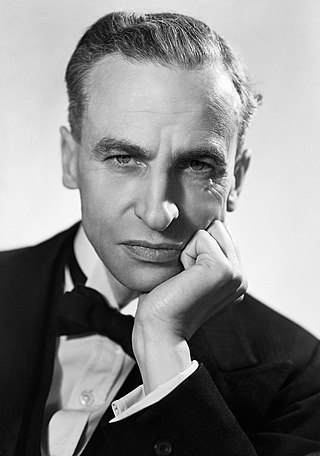
Archibald Henry Macdonald Sinclair, 1st Viscount Thurso,, known as Sir Archibald Sinclair between 1912 and 1952, and often as Archie Sinclair, was a Scottish politician and leader of the Liberal Party.

The 1924 United Kingdom general election was held on Wednesday 29 October 1924, as a result of the defeat of the Labour minority government, led by Prime Minister Ramsay MacDonald, in the House of Commons on a motion of no confidence. It was the third general election to be held in less than two years. Parliament was dissolved on 9 October.
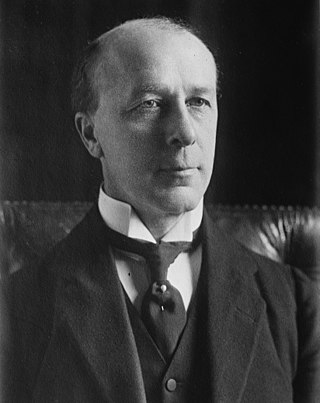
Reginald McKenna was a British banker and Liberal politician. His first Cabinet post under Henry Campbell-Bannerman was as President of the Board of Education, after which he served as First Lord of the Admiralty. His most important roles were as Home Secretary and Chancellor of the Exchequer during the premiership of H. H. Asquith. He was studious and meticulous, noted for his attention to detail, but also for being bureaucratic and partisan.
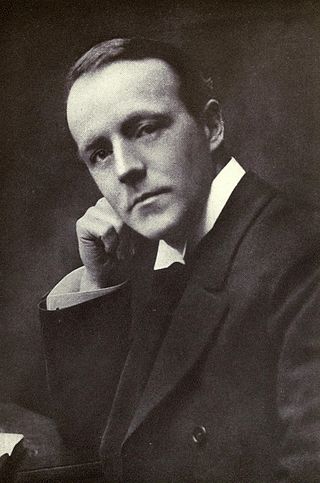
Walter Runciman, 1st Viscount Runciman of Doxford, was a prominent Liberal and later National Liberal politician in the United Kingdom. His 1938 diplomatic mission to Czechoslovakia was key to the enactment of the British policy of appeasement of Nazi Germany preceding the Second World War.

Helen Violet Bonham Carter, Baroness Asquith of Yarnbury,, known until her marriage as Violet Asquith, was a British politician and diarist. She was the daughter of H. H. Asquith, Prime Minister from 1908 to 1916, and she was known as Lady Violet, as a courtesy title, from her father's elevation to the peerage as Earl of Oxford and Asquith in 1925. Later she became active in Liberal politics herself, and was a leading opponent of appeasement. She stood for Parliament and became a life peer.

Cyril Asquith, Baron Asquith of Bishopstone, PC was an English barrister and judge who served as a Lord of Appeal in Ordinary from 1951 until his death three years later.

Black Friday was a suffragette demonstration in London on 18 November 1910, in which 300 women marched to the Houses of Parliament as part of their campaign to secure voting rights for women. The day earned its name from the violence meted out to protesters, some of it sexual, by the Metropolitan Police and male bystanders.

The Liberal government of the United Kingdom of Great Britain and Ireland that began in 1905 and ended in 1915 consisted of two ministries: the first led by Henry Campbell-Bannerman and the final three by H. H. Asquith.
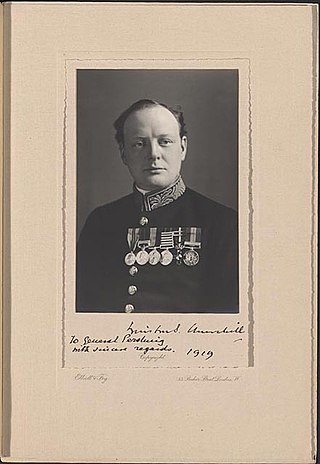
The Dardanelles Commission was an investigation into the disastrous 1915 Dardanelles Campaign. It was set up under the Special Commissions Act 1916. The final report of the commission, issued in 1919, found major problems with the planning and execution of the campaign.

Winston Churchill, in addition to his careers as a soldier and politician, was a prolific writer under the variant of his full name 'Winston S. Churchill'. After being commissioned into the 4th Queen's Own Hussars in 1895, Churchill gained permission to observe the Cuban War of Independence, and sent war reports to The Daily Graphic. He continued his war journalism in British India, at the Siege of Malakand, then in the Sudan during the Mahdist War and in southern Africa during the Second Boer War.
This article documents the career of Winston Churchill in Parliament from its beginning in 1900 to the start of his term as Prime Minister of the United Kingdom in World War II.
Richard John Toye is a British historian and academic. He is Professor of History at the University of Exeter. He was previously a Fellow and Director of Studies for History at Homerton College, University of Cambridge, from 2002 to 2007, and before that he taught at University of Manchester from 2000.
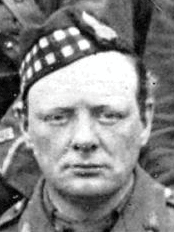
The 1917 Dundee by-election was a parliamentary by-election for the British House of Commons constituency of Dundee in the county of Angus held on 30 July 1917.

The Royal Naval Division Memorial is a First World War memorial located on Horse Guards Parade in central London, and dedicated to members of the 63rd Division (RND) killed in that conflict. Sir Edwin Lutyens designed the memorial, which was unveiled on 25 April 1925—ten years to the day after the Gallipoli landings, in which the division suffered heavy casualties. Shortly after the war, former members of the division established a committee, chaired by one of their leading officers, Brigadier-General Arthur Asquith, to raise funds for a memorial. Progress was initially slow. The committee planned to incorporate its memorial into a larger monument proposed by the Royal Navy for Trafalgar Square. When the navy abandoned that project, the RND's committee decided to proceed independently. They engaged Lutyens, who, after negotiation with the Office of Works, produced a design for a fountain connected to the balustrade of the Admiralty Extension building.

The Battle of Downing Street was a march of suffragettes to Downing Street, London, on 22 November 1910. Organized by Emmeline Pankhurst's Women's Social and Political Union, the march took place four days after Black Friday, a suffragette protest outside the House of Commons that saw the women violently attacked by police.

The Calais Conference took place in the French city of Calais on 6 July 1915. It was intended to improve communication between the British and French governments on strategy for the First World War. It was the first face-to-face meeting between the British and French prime ministers H. H. Asquith and René Viviani. The meeting was poorly organised and no formal record was made of the decisions. The French thought that the British had committed to a major offensive on the Western Front while the British thought they had persuaded the French that the main British effort that year should be in the Gallipoli campaign. A meeting between military leaders at the conference led to a target of 70 divisions being set for the British Expeditionary Force, which would require the imposition of conscription.
References
- ↑ Cassar, George H. (1994). Asquith as War Leader. Continuum International Publishing Group. p. 235. ISBN 1-85285-117-1., as available from Google Books.
- ↑ The Oxford Library of Words and Phrases. Vol. I. Oxford University Press. 1981. p. 71.
- ↑ Rasor, Eugene L. (2000). Winston S. Churchill, 1874-1965: a comprehensive historiography and annotated bibliography . Greenwood Publishing Group. p. 25. ISBN 0-313-30546-3., as available from Internet Archive.